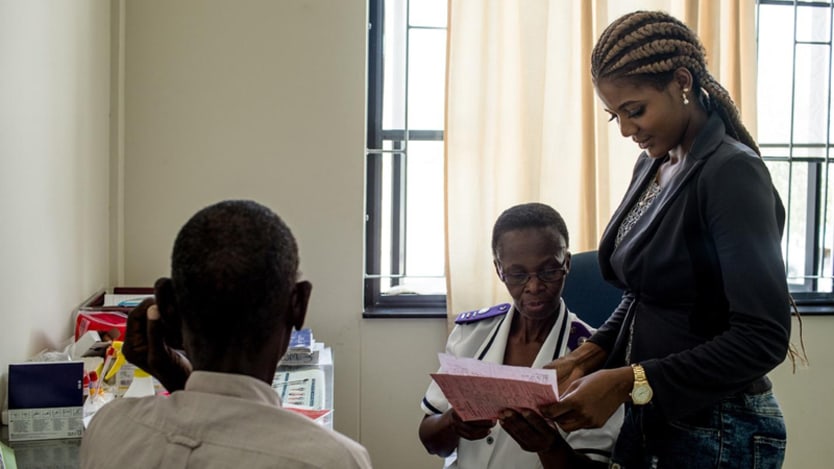
Shirley Mwellie was about to get on a plane when she got the letter. It had arrived while she was visiting family in her hometown of Windhoek, Namibia, on leave from her job in England, where she’d been working as a nurse for 14 years. Mwellie is 69, well past the mandatory retirement age of 60 for nurses in Namibia.
The letter caught her eye because it was addressed to Namibian nurses either in retirement or about to retire, who were up for a challenge: Would they like to keep working for another two years and help fill a crucial gap in the country’s health workforce?
“And so,” Shirley said raising her eyebrows with a smile, “I decided to stay. It’s good to be amongst your own people, saving your own people,” she says. “You know their difficulties. You know what they are striving for.”
Namibia was one of the hardest-hit countries during the height of the HIV epidemic, when some 22 percent of the adult population there was infected. HIV prevalence remains high today at 13.3 percent, according to the Ministry of Health and Social Services.
Like many countries in the region, Namibia has a shortage of health workers. Until the past decade or so, it has relied on immigrants from other African countries to fill the gaps, while many of Namibia’s few homegrown nurses left for higher-paying opportunities in private hospitals or abroad.
See more related stories:
▶ Q&A: How Swaziland got on track to contain the world's highest HIV prevalence
▶ HIV advocates fear US cuts and 'gag rule' could undermine global progress
▶ HIV treatment: Strategies to reach the next 10 million patients
Then in 2013, Namibia became the first country to conduct a national assessment using the World Health Organization tool, Workload Indicators of Staffing Needs. As a result, the government now has hard data on exactly how many health workers its people need in each health facility, as well as which types are most in demand, and where.
Solving the shortage won’t happen overnight. To speed up the process, Namibia’s Ministry of Health and Social Services and the U.S. Agency for International Development teamed up to recruit much-needed HIV nurses from an unlikely candidate pool: Retirees.
An unconventional idea
The idea emerged when the ministry asked IntraHealth International’s USAID Technical Assistance Project to help it recruit 80 additional nurses and deploy them to the areas with the greatest HIV prevalence and highest unmet need for antiretroviral therapy, or ART, mostly in the country’s north.
IntraHealth agreed to help. “Then I thought to myself, ‘Where am I going to find these nurses?,’” recalls Pamela McQuide, IntraHealth’s country director in Namibia and a nurse by training. Local health professional schools are training new cohorts of in-demand health workers, she says, but they’re not in the workforce yet.
The mandatory age of retirement for nurses in Namibia is relatively low. Regardless of whether a nurse is still healthy and willing to work — which is more and more often the case — those in the public sector must retire from the workforce when they reach 60.
This gave McQuide an idea.
IntraHealth put out adverts calling on retired nurses from around the country, asking if any would be willing to come back to work for two years, which is the duration of the project — buying time for more newly trained health workers to graduate. The influx of workers would also inject experience into the country’s work to achieve the UNAIDS 90-90-90 targets for HIV. To reach that target, Namibia will have to put an additional 42,000 patients on ART.
Forty nurses, including Mwellie, answered the call.
“We don’t want to sit,” Mwellie says from her new station at the Omuthiya District Hospital's HIV clinic in northern Namibia. “We want to do.”
A new dynamic
A whole new health care dynamic is cropping up in facilities where the unretired recruits are stationed. More Namibians have access to HIV care closer to their homes.
Many of the older nurses, particularly those trained on HIV services, take a holistic approach to care. Mwellie and her colleagues tend to go off-script during client interactions — “How are you feeling about things today?” they might ask.
Many clients are unused to this. Understaffed facilities and heavy client loads sometimes make that level of interaction impossible. Having more hands on deck — particularly hands that have a lifetime of experience — can help make it possible.
A client named Johnas Nstor was recently visiting Omuthiya and talking with Olivia Nandy, 68, another nurse hired by the project. He was nervous about the visit and fidgeting, but Nandy spoke kindly as she explained the medications he needed.
“You are very good people,” he told her at the end of his visit. “I thought maybe you would shout at me because I wasn’t taking my medication. But you are good people.”
The older nurses share their expertise with their younger colleagues. The younger health workers have things to teach them, too.
“It can be a challenge with the ART care,” says nurse Ruusa Shipena, ART supervisor at Shanamutango Clinic at Onandjokwe Hospital, who oversees several of the unretired nurses in their work. “Most of the retired nurses have never worked with HIV care in the past, so they must get used to this concept. Some learn fast, but we have to be patient, because it’s all new to them.”
In her work, Mwellie has seen trouble beyond just HIV. Substance abuse in northern Namibia is a huge problem, she says, and there are very few services for the elderly. As Namibians live longer — particularly those who live with HIV — they will need more complex care that doesn’t exist.
When she “re-retires,” Mwellie says, maybe she’ll open a clinic to fill that gap.
Recommendations
McQuide and her team have three recommendations for other countries working to creatively build fit-for-purpose health workforces in the midst of health worker shortages.
They have learned to first review policy, which may be unintentionally holding the health workforce back. In Namibia, the mandatory retirement age may be keeping plenty of nurses who are eager to keep working out of the workforce, even as the country desperately needs them.
Interventions should also look locally first. Homegrown health workers are crucial to maintaining trust within their communities and are the most sustainable solution to the shortage.
Finally, find creative ways to put experience to work. In Namibia, the team has found that many clients immediately trust and respect older nurses, whose age and experience are unparalleled assets when it comes to HIV care — and health services of all kinds.
Join the Devex community and access more in-depth analysis, breaking news and business advice — and a host of other services — on international development, humanitarian aid and global health.








